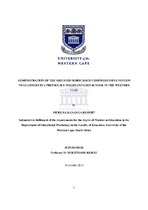Administration of the adjusted Rorschach comrehensive system to learners in a previously disadvantaged school in the western Cape
Abstract
The study focuses on the administration procedure of Adjusted Rorschach Comprehensive
System (ARCS) to learners from a previously disadvantaged school in the Western Cape. ARCS
is the Rorschach administration procedure developed by Moletsane-Kekae (2004) in her research
study. The aim of the study was to determine the response rate of learners from a previously
disadvantaged school when they were exposed to the Adjusted Rorschach Comprehensive
System (ARCS). The objectives are to determine the possible factors that can lead to high and
low response rate when administering Adjusted Rorschach Comprehensive System (ARCS). The
main assumption that guides the study was that the responses of the administration of Adjusted
Rorschach Comprehensive System (ARCS) to the learners from a previously disadvantaged
school in the Western Cape would yield more than 14 responses (R>14). The study adopted a
qualitative approach, case study design, interpretivist paradigm. The Rorschach test, ARCS
procedure, observation, interview, and Field notes were used as data collection techniques. The
sample was made of six learners (3 girls and 3 boys) in Year 1 selected from a previously
disadvantaged school in Cape Town. In order to analyze the data, the thematic analysis and
interpretation procedures were used. The results revealed that the majority of the learners gave
high responses, because the ARCS accommodated their cultures, believe and backgrounds. This
study found out that language, seating arrangement, strategies using during the ARCS procedure
were the factors that influenced the higher response rate. Furthermore, the study also found that
the lack of previous exposure and experience of the psychological test was a factor that can lead
to low response.

